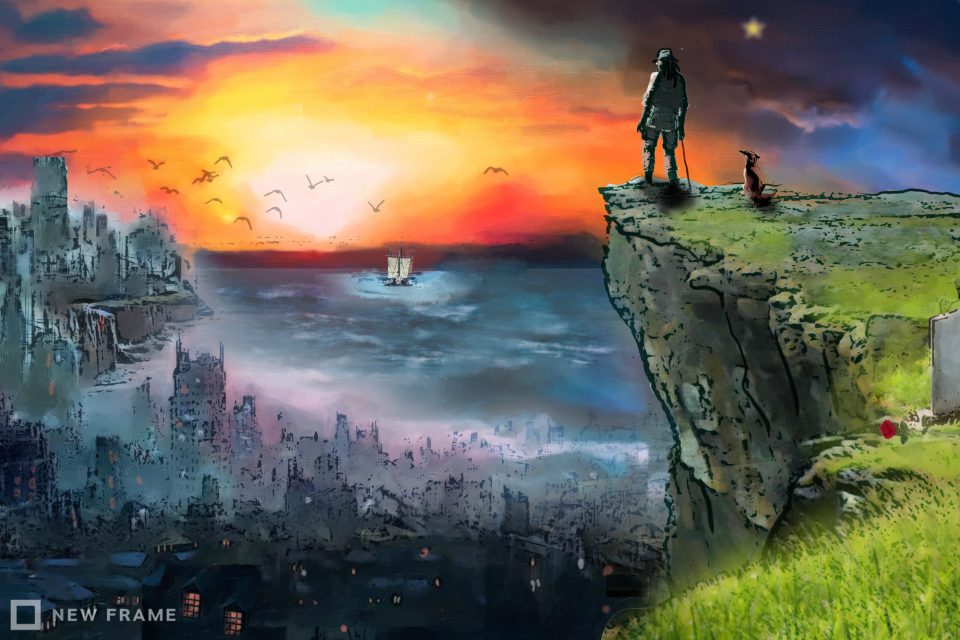Text Messages | After the apocalypse
As we navigate a world that suddenly has become uncharted, solace can be found in After London, published in 1885, a remarkable science fiction novel that speaks to our Covid-19 condition.
Author:
23 April 2020

One hundred and sixty years before Francis Fukuyama made his breathless claims in The End of History and the Last Man (1992), the painter of the “apocalyptic sublime”, John Martin, made his deeply moving watercolour The Last Man. The painting shows a somewhat Christ-like man standing on cliffs overlooking the sea, a seemingly empty seaside town bathed in eerie light below him, and a fiercely red setting sun blurred behind banks of black clouds to the left. Near the man lies a lifeless body – a woman, to judge by the clothing.
Martin first made a study of this theme in 1826, and was to return to it in an oil painting dated 1849. In this last work, the man is aged and has a long white beard. He faces the sun defiantly, with a raised right hand. The figure of the woman is now more distinct and lies directly behind him. Whereas in 1832 the man looked out of the painting at the viewer, here his whole being is directed towards the sun.
Martin’s painting could well have inspired the poet AE Housman when he wrote his now famous seven-liner:
Ensanguining the skies
How heavily it dies
Into the west away;
Past touch and sight and sound
Not further to be found
How hopeless under ground
Falls the remorseful day.
(Published posthumously in the collection More Poems.)
It was with exquisite judgement that Oxford University Press used The Last Man (1832 version) on the jacket of After London or Wild England by Richard Jefferies. This masterpiece of nature writing, extraordinary fantasy novel and significant work of science fiction was first published in 1885. Its young author was already badly stricken with the tuberculosis that was to kill him two years later at the age of 39.
After London deals with England after London and the rest of the country are affected by an “Unknown Orb”. Effectively destroyed, the great city is uninhabitable, most of its populace flee abroad by ship, and nature overtakes not only the capital but much of the country. Part I, “The Relapse into Barbarism”, making up about one-fifth of the book, is a masterly depiction of human life regressing in the absence of universally agreed modes of behaviour, travelling, agriculture, commerce, worship and other integral aspects of human existence.
After the fall
In that, After London speaks to the world’s current situation of flight, refuge and thinking about remaking the world after the coronavirus outbreak. Jefferies paints a picture of a postlapsarian world in which the great centre of social and economic evil, London, is no longer. The way to a new world seems to beckon, fresh with possibility, exactly the same consideration that at present is exercising thinkers and governments of both the Left and the Right.
Sadly, the reality of the novel is different, as ours may well be. The pre-industrial, pre-commercial world that evolves in England is not a pastoral idyll but a patchwork of competing rural poverties. Selfishness and greed assert themselves as the primary elements of human nature and the book’s protagonist, Sir Felix Aquila, discovers that he is not the paragon of virtues that he believed he was.
Felix is on a journey, the sort that Jefferies muses about in his notebooks: “In the heart of most of us there is always a desire for something beyond experience. Hardly any of us but have thought, Some day I will go on a long voyage, but the years go by and still we have not sailed.”
Related article:
The millions stuck at home because of widespread lockdowns would certainly empathise with those sentiments. They would find solace, too, in the reality that our world is unlikely to relapse in quite the same way of Jefferies’s imagination.
When Oxford University Press republished After London in 1980, after almost a century of neglect, it was to revive awareness of Jefferies. Readers picking up the book today will find much in it that speaks to the Covid-19 world because his startling novel is, in the words of the great literary critic Queenie Dorothy Leavis, filled with “instinctive humanity and indignant expression”.
Here is how it begins:
“The old men say their fathers told them that soon after the fields were left to themselves change began to be visible. It became green everywhere in the first spring, after London ended, so that all the country looked alike.”
And ends:
“Felix pushed on, absorbed in thought. The sun sank; still onward; and as the dusk fell he was still moving rapidly westwards.”

